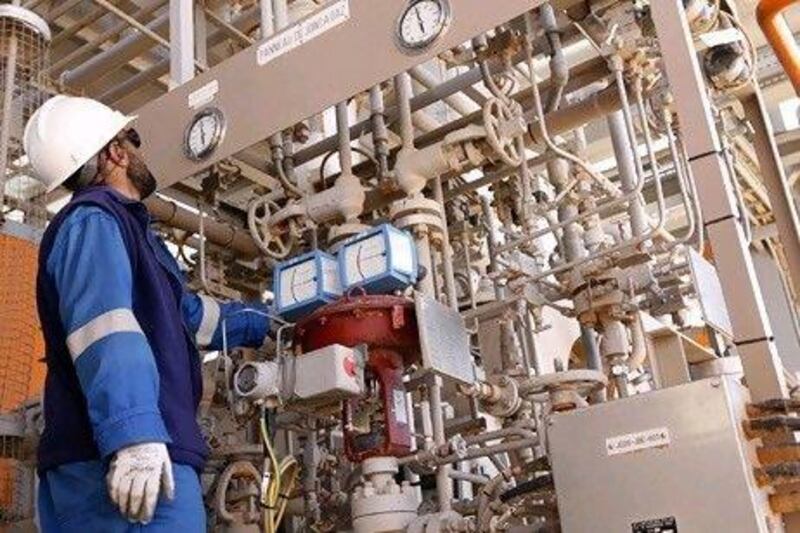The two great gas powers of the Arab world are Qatar and Algeria. Yet at the Gas Exporting Countries Forum last year, and in this year's Libyan revolution, Qatar has dealt its rival two resounding defeats. These embarrassing outcomes have shown the ruling military junta in Algeria to be incompetent, not just in its management of the oil sector and the economy, but also in foreign policy.
Colonel Muammar Qaddafi's wife, Safiya, daughter Aisha and sons Hannibal and Mohammed, gained refuge in Algeria, although reportedly Col Qaddafi himself was refused entry.
This continues Algeria's incoherent stance on Libya, in which professed neutrality and hopes for a multilateral solution have alternated with moral and, it seems, material aid to the Qaddafi regime.
Stuck in discourse from the 1960s, out of line with the Arab public opinion reflected by Al Jazeera, Algeria has drawn to itself renewed comparisons with other toppled North African regimes. As its newspaper El Watan observed: "History is in the making and where is Algeria? Absent, lethargy-stricken!"
The Algerian economy shows many of the same failings as those of other revolutionary Arab countries. Although unemployment has fallen since the turn of the century, it is still about 10 per cent. Poverty is growing, property is unaffordable, and the cost of food is rising. As in Egypt and Tunisia, economic pseudo-liberalisation has primarily served to enrich and entrench a corrupt elite.
In Algeria's case, this is Le Pouvoir (the power), a military clique, veterans of the war of independence from France and the 1990s civil war against violent Islamists. The usual machinery of rigged elections, compliant opposition parties, a weak parliament and co-opted judiciary has kept Le Pouvoir in control, despite worries over President Bouteflika's health, his lack of a clear successor, and regime infighting.
Protests in February were quelled with relative ease and limited violence. Bitter memories of the civil war, in which at least 100,000 people died and both sides committed appalling atrocities, led many to be wary of demonstrating.
Unlike Tunisia, Egypt and Syria, Algeria's rulers have ample petroleum earnings to quell discontent, and unlike the Qaddafi regime, they had the sense to distribute some of them to the population. Similar to Saudi Arabia, they offered appeasement in the form of a disjointed US$286 billion (Dh1.05 trillion) package of food subsidies, youth employment, infrastructure and housing. Instead of an overall vision, there is simply more spending without reform.
Algeria is the second-largest gas exporter to Europe after Russia, and the fifth-biggest in the world. Its main customers in Spain, Italy and France thus watch it keenly for any signs of trouble.
But Algeria's oil and gas sales will not bail out its economy forever. Its oil reserves, 12 billion barrels, are modest compared with those of the Gulf countries, and its gas reserves are less than a fifth of Qatar's.
Ambitious 2005 plans to increase gas exports by a half foundered immediately. Instead, production has dropped sharply, with rumours about water appearing in wells at Hassi R'mel, its largest field. In a familiar story, domestic consumption spurred by low, subsidised prices, has eaten into exports.
The country's 40-year-old pipelines are not being repaired and are prone to disruptions. Oil production, about equal to Libya's prewar level, has been gradually slipping since its 2005 high.
New investment is deterred by tough tax terms, bureaucracy, and a corruption scandal that has paralysed the state oil company Sonatrach, now virtually a fiefdom of the security agency. With big projects in Iraq and the likely return of Libyan oil, there are more alluring destinations for oil companies' dollars.
Chakib Khelil, a former oil minister, although a respected reformer, blundered badly just before the 2008 economic crisis when giving up secure long-term gas sales contracts for short-term deals. His successors at Sonatrach compounded the error late last year by signing long-term deals at the bottom of the market.
At Oran in April last year, Mr Khelil pleaded for a coordinated production cut by gas exporters; humiliatingly, his proposal was not even tabled. Qatar exploited its victory by taking advantage of Algerian overpricing to gain market share in Europe, yet successfully maintaining its premium Asian contracts.
Algerian hydrocarbons comprise 98 per cent of the country's exports but contribute just 5 per cent of jobs. Little has been made of agricultural and tourism potential, proximity to Europe and the advantage of speaking a European language, French. Instead of Algeria's becoming a low-cost manufacturing centre in the style of Slovakia, industry's share of the economy has dropped from 10 per cent a decade ago to a pathetic 5 per cent today.
Outmanoeuvred by its Qatari rival, Algeria has solved none of its underlying problems. Even the Algerian newspaper L'Expressionobserved that Col Qaddafi "was certainly not the last" of the region's dictators to fall. An unrepentant Algeria is in a position to undermine its neighbours' fledgling democracies.
Yet if Libya and francophone Tunisia succeed, the failures of Algeria's old guard will be more exposed than ever.
A Robin Mills is an energy economist based in Dubai, and the author of The Myth of the Oil Crisis and Capturing Carbon





